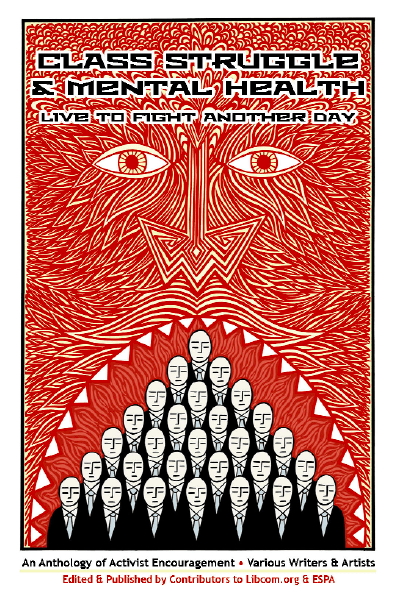From libcom.org. Why aren’t we rising up? Whether the ‘we’ in question is young people, the British people, or the poor, this is a question asked an awful lot by both mainstream and leftist commentators. Austerity, job cuts, pay freezes, workfare, poverty, food banks, police brutality, political corruption – it’s all the rage, so why aren’t we all enraged?
There are two standard answers on the left: apathy and the lack of leadership. Either people are too engrossed in their own little world of X Factor, I’m a Celebrity and ‘I’m alright Jack,’ or they just don’t have the right hero to lead them into battle. The left wing rabble rousers of the past are dead and gone and we need people to replace them and rally the workers.
The trouble is, both of these answers are wrong. Moreover, they play into a convenient myth that helps the pale, stale males of the authoritarian left sustain themselves while doing nothing at all to stop the world around us decaying into shit.
People are not apathetic
Well, sure, some are. Everyone knows at least one person who’s aggressively and proudly apolitical. They “don’t want none of that” if anything halfway substantial comes up in conversation, yet it always turns out that they’ve internalised the narratives of the right wing press on how immigrants and scroungers are to blame for everything.
These people do exist, but to tout them as an archetype for the public-at-large and that’s just wrong.
There’s a level of truth, as with any stereotype. But when the world’s full of problems and there’s no effective counter to the dominant narrative (we’ll get to that) then of course you take the answers available. Even if they’re racist, classist and built on a foundation of lies.
But speak to the vast majority of people, and they’re not apathetic. They have opinions on political issues. A great many have a fairly solid unconscious understanding of class and their lot in life. Where they have internalised ruling class ideology, they’re smart enough to realise and change their mind if you engage with them and talk to them.
This goes against the labels thrown around, particularly by crackerjack hacktivists such as Anonymous and batshit conspiracy theorists but also by some on the left, such as ‘sheeple’ and suggestions that everyone not already out on the streets protesting is brainwashed. In fact, they’re alienated, exploited and oppressed under capitalism and this kind of activist mentality is toxic and does nothing to advance the class struggle.
So what about the supposed ‘need’ for leaders?
Resistance doesn’t happen spontaneously. It happens when people organise, make conscious decisions and act upon them. This requires people to take the initiative, the sharing out of roles and responsibilities, and not a bit of education and agitation.
But while this could be considered a type of leadership – a ‘leadership of ideas,’ for want of a better term – it’s not leadership in the sense that most on the left mean it.
When the left’s kind of leadership emerges it’s easy to recognise – it involves representation by prominent spokespeople instead of empowering people to act for themselves. It involves executive power concentrated in the hands of a few. It involves a division of labour between ‘activists’ and ‘intellectuals.’ It involves a clear hierarchy with activity directed from above and disagreement of any kind condemned as ‘divisive’ or ‘sectarian.’
By and large, people don’t want this. When this kind of leadership emerges, if it fills a vacuum then it will attract people – at first. The vast majority of people will tire of being directed like pawns, treated as an expendable resource and having little to no say in decision making. This is not only why the leftist confessional sects such as the Socialist Party, SWP and so on have such a high turnover of membership, their cadres a minorrity next to their paper membership, but also why the fronts they set up lose momentum once the formulaic authoritarianism loses its novelty.
It’s also why movements which have arisen in the wake of the crisis have lacked this kind of hierarchical structure. UK Uncut and Occupy being the most commonly cited examples. In the fight against the Bedroom Tax, local groups acted for themselves and built up horizontal federations while the Trot fronts seeking to capitalise on the struggle floundered on the sidelines.
But there’s still a gap that needs filling. The Occupys of this world have their own flaws, the ‘tyranny of structureless‘ meaning that invisible hierarchies tend to emerge and those who seek to ‘represent’ others by imposing their own views on the collective don’t have to deal with formal representative democracy.
We need organisation and democracy, but it should be non-hierarchical organisation and direct democracy. Organisers should seek to give people the confidence to act for themselves, not merely to follow the organiser and keep them in their position for a long time to come. Officers should be mandated delegates with limited tenure, no executive power and the ability to be recalled by the mass. Democracy should mean making the decisions for ourselves, as in a strike ballot, rather than electing someone else to make decisions for us, as in a general election.
People as a broader whole are not apathetic, nor are they waiting for a leader. If we are led, then the destination is never freedom but a different kind of domination. If we want an uprising, then it requires hard work, patience, agitation and most importantly a desire to organise so that we can all fight for ourselves rather than being chewed up and spat out by any one of the myriad, toxic would-be leaderships that the authoritarian left has to offer.



